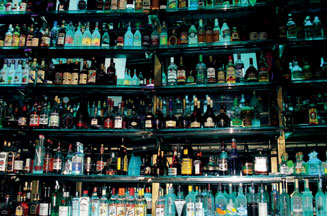
The much-hyped clampdown on irresponsible drinks promotions was formally declared in a mandatory code announced by home secretary Jacqui Smith as part of an effort to tackle what the government considers binge-drinking, supported by the roll-out of a £10m campaign this year.
The code, which is out for consultation but highly likely to go through in its entirety, will ban offers such as 'all you can drink for £10' and prevent pubs and bars from aiming promotions at certain groups, as with 'ladies' night' free drinks offers. It does, however, stop short of banning 'happy hours', perhaps because ministers fear being labelled killjoys in recessionary times.
More of a surprise, however, is the proposal that supermarket customers should not be required to buy 'very large amounts' of alcohol to obtain discounts. The subject has sparked fierce political debate over the past year, pitting pro-pub groups and health lobby campaigners against the off-trade, which uses alcohol as a loss leader. It also caused a schism in government, as the Department for Business, Enterprise and Regulatory Reform sided with retailers while the Department of Health and, to a lesser extent, the Home Office pushed for minimum pricing measures. What constitutes 'very large amounts' is not yet clear, but will no doubt be hammered out during the consultation period.
Drinks producers, blamed for so long for the excesses of the on-trade, have given their backing to the code. Benet Slay, managing director of Diageo GB, is one industry chief to express support. 'Diageo believes industry and government should work together to eradicate bad promotions, whether in shops, super-markets, clubs, bars or pubs,' he says. 'We recognise that the good work of the majority in the industry is under-mined by the conduct of a minority.'
However, Slay raises concerns over whether the code will be enforced consistently across the country, as it is expected to be policed by local licensing authorities. 'Government needs to be explicit about what is and isn't accept-able for local licensing authorities, and work with the industry to ensure that the standards are understood and fully implemented,' he says.
Richard Brown, managing partner of drinks strategy consultancy Cognosis, is also in favour of the proposals. 'The really good thing is that the rules focus squarely on the retailers and licensees,' he says. 'Mandatory con-trols for them and voluntary controls for producers seem an intelligent strategy.'
However, not everyone is in favour of the compulsory measures. Annie Swift, chief executive of the Institute of Sales Promotion, expresses disappointment at the mandatory nature of the code. 'We would like to see the government encouraging drinks retailers to come up with an effective self-regulatory system before imposing a compulsory one,' she argues. 'Self-regulation
works for the drinks producers, through the Portman Group, and it works for the advertising of alcohol, through the Advertising Standards Authority.'
To coincide with the unveiling of the code, the government has also published a long-awaited report from the University of Sheffield into alcohol promotion and pricing, and its links with alcohol-related harm.
The industry had braced itself for a report that made the case for restrictions on drinks advertising, but this did not materialise. A 9pm watershed for alcohol ads was the measure most feared; another idea floating around was the inclusion of responsible consumption messages in the end frames of TV drinks advertisements. The latter is said to be favoured by Gordon Brown.
However, the report's findings on advertising's influence are equivocal. 'There is some uncertainty over the mechanisms linking advertising to consumption, and thus it is unclear whether advertising restrictions can be expected to have an immediate effect on consumption,' it states. 'The international evidence suggests that the effects of advertising may be cumulative over time, and may work through influencing attitudes and drinking intentions rather than consumption directly.'
David Poley, chief executive of the Portman Group, welcomes the report's findings.'This study supports our belief that advertising influences brand choice rather than how much consumers drink,' he says.
'Rather than considering advertising bans, the government should exploit more fully the power of social marketing as a force for good.'
Its seems that the government has drinks retailers in the on- and off-trade in its sights. The coming months will be a crucial time for drinks brands, in which they will need to demonstrate that there is no need for further advertising restrictions or increased regulation.


.jpg)


.jpg)